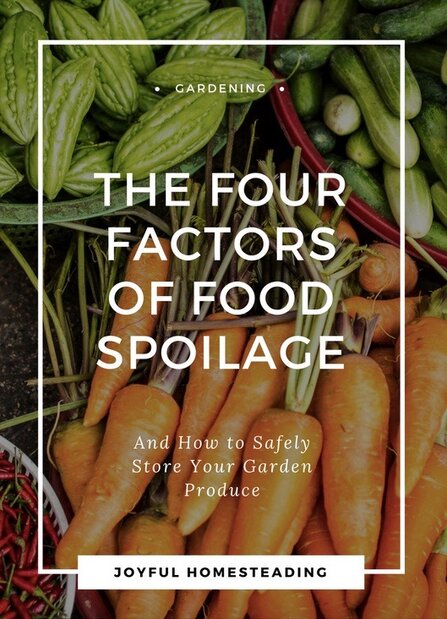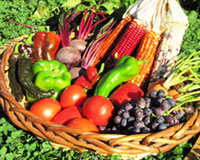Storing Garden Produce
for Self Reliant Gardening
Storing garden produce is not only a great way to make the most of your bounteous harvest, but crucial if you plan on pursuing self-reliant living. Not only will you save money by growing your own food, you will produce organic food that will be far better for your health.

With the increasing use of genetically modified crops by commercial growers, more and more produce on the market can be downright dangerous.
But by learning to store your garden bounty you can have your own locally grown, organic food all year round.

Plus, should disaster strike and you are unable to get to the grocery store, whether through an ice storm, hurricane or man-made disaster, you will be prepared and have good food on hand. But there are some things to keep in mind when storing your own food.
Storing Garden Produce
The Basics
When you start thinking about storing garden produce, four factors of food spoilage to keep in mind include bacteria, fungi, yeasts and enzymes.
Bacteria
Bacteria, which can both produce toxins or can be toxic in their own right, are one of the main causes of food poisoning. To keep your food safe over the long run, you must either kill the bacteria or slow their growth. By using extreme heat, such as canning your food in a pressure cooker, you kill the bacteria, remove the oxygen and keep your food fresh.
You can also slow the growth of bacteria by pickling your food in sugar or salt. This puts your vegetables in an acidic condition, slowing the growth of bacteria.
Enzymes
Enzymes are great when it comes to digestion, but terrible when it comes to storing garden produce. Again you have two choices when it comes to enzymes. You can either destroy them through extreme heat (canning) or by using cold to stop the enzymes temporarily.
Yeasts
Like enzymes, yeasts do have a useful purpose. They're great for fermenting sugar to make wine, beer, cider and bread. Unfortunately, they're not so great when they ferment your jam. You can either stop the fermentation through canning or by freezing your jams.
Methods of Storing Garden Produce
Canning your fruits and vegetables is one way to preserve your food, but it's not the only way. There is a variety of ways to have your garden produce on hand through the winter months. Here are a few:
Invest in a Root Cellar
A root cellar is a great method of storing garden produce such as beets, potatoes, winter squash, apples and turnips. By using an underground cellar with a venting system that you control at will, you allow the cold winter air in until your cellar is at the right temperature - between the mid-thirties to the forties Fahrenheit.
The earthen insulation keeps the cold air in for months, and a gravel floor will allow the natural earthen moisture to seep through, providing cold, damp air, just the way your vegetables like it.
Dehydrate Your Food
Another great way to preserve your garden produce is to dehydrate it. Bacteria and harmful enzymes can't grow without moisture, so taking that moisture away will preserve the nutrients in your food and keep it edible for a long time.
You can either dry your food in the sun, in a low temperature oven or by using a commercial food dehydrator. Protect your dehydrated food by vacuum sealing it in quart jars. Don't vacuum seal dehydrated food in the bags. The food will clump together and get hard as a rock.
Fermenting Your Food
If you have space in your refrigerator or some shelves in the warmer part of your root cellar, fermenting your food is an easy and healthy way to preserve your food. You can make your own healthy sauerkraut by cutting up a cabbage, cutting out the core and saving it along with the outside leaves. Place the cut-up cabbage in a bowl and add enough salt for taste.
Knead the cabbage for five minutes until you can see juice at the bottom of the bowl. Place the cabbage and its juice in a quart jar, covering it with the leaves and placing the core on top, to push the cabbage into its own juice.
Cover it with a lid and leave it on the counter for a few days, opening the jar twice a day to allow the gas to escape. Within a few days you have a healthy, fermented food that will last months in the refrigerator.
Freezing Your Produce
Freezing fruits and vegetables is another great way to preserve food. If you vacuum seal your vegetables in addition to freezing them, they will last for a year. For most vegetables, you will need to blanch them first by dropping them in boiling water for 30 seconds and then quickly dunking them in iced water to stop the cooking process.
Then place the vegetables on a cookie sheet and freeze them overnight. Once your vegetables are frozen, you can then vacuum seal them in bags.
Learn More About Self Reliant Living










New! Comments
Have your say about what you just read! Leave me a comment in the box below.